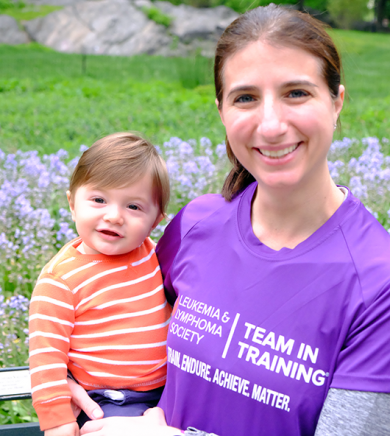Hitting Her Stride
Dr. Lisa Roth was newly married and fresh from a fellowship in pediatric hematology/oncology when she became a cancer patient: a swollen lymph node near her collarbone proved to be part of a larger tumor in her chest. Dr. Roth — an assistant professor of pediatrics, of pediatrics in medicine, and of pathology and laboratory medicine — completed a four-month course of chemotherapy for Hodgkin lymphoma in December 2013. A few months later, with her disease in remission, she began training for a 10K with the Leukemia & Lymphoma Society. She ran that race, then tackled her first half-marathon — and in 2015, she gave birth to a son.
You’ve dedicated your career to treating and researching cancer — Hodgkin lymphoma in particular. What was it like to have the disease yourself? In some ways it was very challenging, because I understood all the complications that could arise. But on the other hand, I knew that Hodgkin lymphoma is relatively curable, so that was comforting. I was surprised at what aspects were hardest for me, like losing my hair — being visibly sick. As a doctor, you’re usually not that vulnerable.
During your treatment, did you ever wish you knew less about the disease? Absolutely. And at times it was hard to keep my family informed on a level they could understand, because as an oncologist, the discussions I had with my physicians were very different than those that a patient typically has.
How has surviving cancer informed the way you practice now? I relate to my patients in a way that I couldn’t before. I understand all the nuances and stressors of going through this — having your body, which was perfectly healthy, turn on you and flip your world upside down. It’s amazing how every element of your life changes with a cancer diagnosis.
Has it spurred you to do anything specific in medicine? I wanted to turn my experience into something positive, so I started a clinical program focusing on lymphoma in adolescents and young adults. The 18-to-40 age range is a unique place to be as a cancer patient, because you don’t quite fit into the pediatric or adult clinics.
Do you share your treatment experience with patients? I do. I think the people who find it most helpful are young women with lymphoma, who can closely relate. They’re comforted to hear that someone can survive this and go on to have a family, which a lot of them are concerned about.
How has becoming a mom informed your work as a pediatrician? The way that parents fight for their children, how they understand when something is off that others might not notice — as a mother, you really come to appreciate that. You also appreciate that what might seem like minor issues are a big deal to a mom. Factoring that into how I care for the child is something that I’ve incorporated into my practice.
In general, what do you find gratifying about pediatric oncology? Most of my patients are healthy children who suddenly receive the worst diagnosis a parent could imagine. It’s a privilege to help them and their families, and it’s incredibly rewarding to follow these patients for many years, as they go back to their regular lives, start kindergarten, graduate high school and get married.
What are the specialty’s challenges? The stakes couldn’t be any higher, so even the smallest decisions are taken with the most serious consideration. Losing a patient is the most difficult part of the job; those children and their families stay with you forever.
Is there a particular patient who’s indelibly in your memory? The first child I treated in fellowship was a 13-month-old boy with an aggressive tumor called a neuroblastoma. He responded to chemo and was doing well, but the tumor came back, and he passed away shortly after his second birthday. It was heartbreaking to watch his family go through the agonizing decision to stop treatment and take him home — that was my first loss as a physician, and it has stuck with me. His story motivates me to work harder.
Why take up running after your recovery? After you’ve had an experience where your body isn’t working for you, to then be able to turn that around, set goals and push beyond what you thought you could do — that’s very empowering.
This story first appeared in Weill Cornell Medicine, Vol. 16. No. 1.



